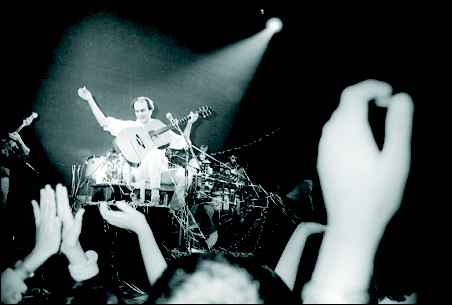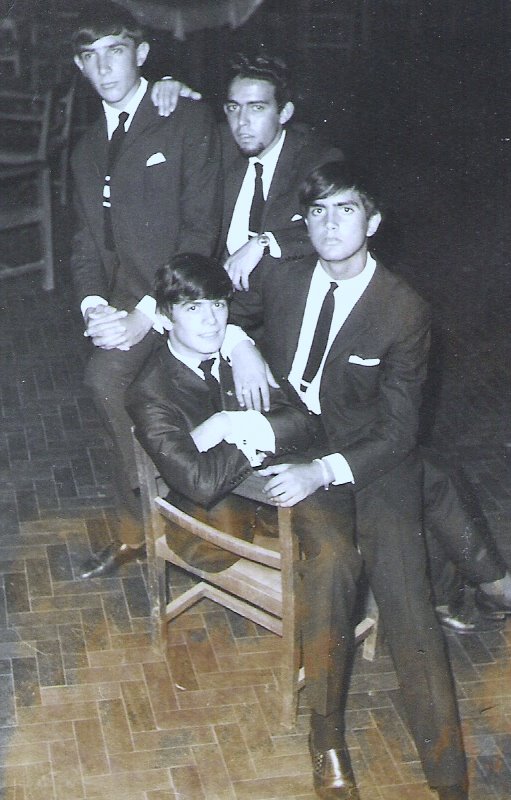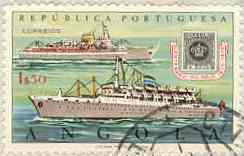Fausto and his music
Fausto is unique. His wonderfull albums of the late 70's got me hooked on his lively Atlantic adventures. The folk instruments, the finely crafted songs, the unmistakable symfonic elements, the African, Indian (Celtic?) undercurrents, the strong political-emotional content contrasted by the sweet Portuguese vocals. It's the stuff of giants, and who outside Portugal knows that?recognition
Some folks tell me that in general the Portuguese do not recognize Fausto's genius. Others tell me that his work - deeply grounded in Portuguese culture - is known and appreciated by many. Especially his 1982 'Por este rio acima' is looked upon (so I'm told) as a milestone in Portuguese music.span a life
Fausto later called 'Por este rio acima' the first of his 'Lusitana Diaspora Trilogy', #2 being his 1994 'Crónicas da Terra Ardente'. Extrapolation would have #3 in 2006 but Fausto took some extra time and indeed in 2011 he released it under the name: 'Em busca das Montanhas Azuis'. A genius work of art 30 years in the making, interrupted by several fine fine releases. Awe-inspiring.appearances
Fausto is purported to be a rather private man, rarely appearing in public. He only gives a handful of concert each year. Only Lisbon and Sines were treated with a 2004 A ópera mágica do cantor maldito concert.
Fausto live in Belem 1999 (music released on 'Â Grande, Grande é a Viagem')

Os Rebeldes late 60s. Tony Matos, Luís Manuel, Fausto & Vicky.
naval history in art
Probably the most important theme in Fausto's work is the grand naval history of Portugal (& Spain), the "lusitana Diaspora". It's interesting to note that Fausto was born on mid-sea on november 26'th 1948 on the 'Patria'.Postcard with "Patria" brought by Jorge Duarte, his father sent it to his mother when he went to Angola in 1954.
Live Sines april 25th 2004
Africa
Fausto grew up & studied in Nova Lisboa on the high plains of cental Angola, a surreal enclave of early 20th century western modernity in the middle of Africa: tidy parks, luxury villa's in spacious lanes, swimming pool, cinema, etc. Nova Lisboa was renamed to Huambo and largely destroyed in the Angolan civil war in 1975.13 more years to go ....
a social heart
Age 20 he moved from Afngola to 'Salazar' Portugal as a musician, starts a band: 'Os Rebeldes' (the rebels) and becomes an active member of the thriving social cultural movement of those days, joining artists like: José Afonso, Adriano Correia de Oliveira, Manuel Freire, José Mário Branco and Luís Cila, these lasts 2 were exiles of the regime.Indeed, social struggle was the first major theme in his work. He released his first record: 'Fausto', 4 years before the 1974 'carnation-revolution'. His more recent work is still very politically aware.
those darn Dutch!
To my surprise I learned that in 1641, when the Portuguese turned to the Dutch (my people) to join forces against Spain, the Dutch invaded the Angolan coastal areas instead, chasing the Portuguese away; blocking the lucrative slave trade. Not with noble intensions I'm sure: the Dutch shipped 10% of all slaves worldwide. It took Brazilian sugar money to ward off the Dutch in 1648. A strange coincidence: that same year Holland and Spain signed the Munster peace treaty, ending 80 years of struggle with the independence of the economically powerful Dutch republic.let me disclaim please
Some of the information on these pages is given to me by visitors, other sources are articles I found on the web. My understanding of Portuguese is shaky (understatement), so I had articles from authors like Viriato Teles auto-translated by Altavista Babelfish - not an accurate method. So if you think I miss the point, or if you have interesting information you want to share, please .Likewise, while some pictures on this website were sent to me by visitors, others were lifted from websites around the world. I'm just collecting and giving back.
